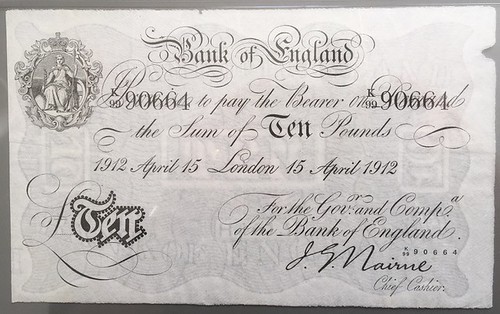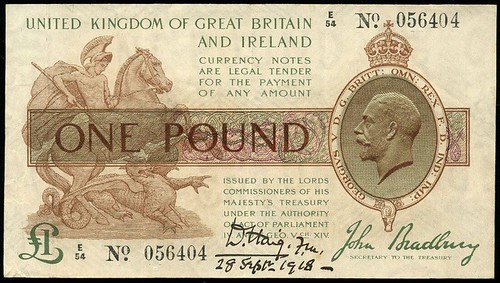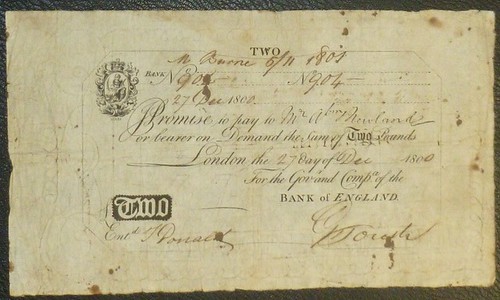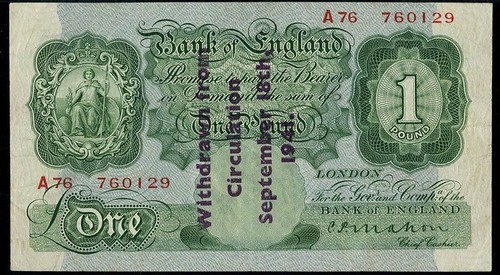
PREV ARTICLE
NEXT ARTICLE
FULL ISSUE
PREV FULL ISSUE
MARK T. RAY COLLECTION OF ENGLISH BANKNOTESFor more interesting banknotes at auction, see the Mark T. Ray Collection of English Banknotes to be auctioned by Spink in October. Here are some selections. -Editor
1. Bank of England £10 note dated 15th April 1912. 
The Bank of England large size white notes are well known and popular with collectors, issued in various values until World War 2, and as £5 notes until 1956. Each issue had a unique serial prefix combination and specific date. This particular date was to become memorable as the date the RMS Titanic hit the iceberg and sank. £10 notes were high value and issued in limited numbers and pre-WWI examples are particularly rare. This is probably the only extant example of this date. Although unlikely to have been carried aboard, after the tragedy there were numerous claims on the Bank by survivors and relatives of those who perished regarding notes or life savings lost at sea. The Bank was sympathetic to the claims and paid out in full.
2. Treasury Bradbury £1 autographed banknotes signed by WWI Allied Army leaders. 
Four English Treasury Issue banknotes have been reunited after being signed by war leaders and personalities auctioned off for charity in 1918. Originally sold by a provincial newspaper to raise funds for starving prisoners of war, the notes are contemporary One Pound notes, three of which have original accompanying letters. The notes show manuscript signatures of Field Marshall Sir Douglas Haig, French General and Supreme Allied Commander Ferdinand Foch, French President Poincaré, and Admiral Beatty.
3. Abraham Newland £2 Bank of England banknote from 1800 
£1 and £2 notes were first issued by the Bank of England during the restriction period 1797-1826 to preserve gold stocks during the Napoleonic wars. Only a handful of £2 banknotes are now thought to have survived, and this one dated 1800 issued under the Chief Cashier Abraham Newland is a lovely example of such a survivor. The lot comes with a Bank letter from 1870 stating that the note was still outstanding, and a recent check of the appropriate ledger in the archive has confirmed it is still unpaid. That someone thought to keep the note in Victorian times having checked out its validity when it could easily have been cashed in makes it now an important item, although if presented to the Bank for payment now I am sure they would be delighted to encash it for its face value.
4. Guernsey Overprints from 1941 on One Pound Notes. 
The Channel Islands being overrun by the German Army during World War II led to a shortage of small change on the island of Guernsey. To alleviate the difficulties faced by the islanders it was agreed to issue a quantity of coin, and an equivalent holding of UK notes by the local bank was set aside. Each of around 5000 withdrawn £1 notes were overstamped as shown, dated September or November 1941. Sometime after liberation these notes appeared on the collector market and have been popular ever since. All the serial numbers have been recorded, and the sale features a good selection. The Mark T. Ray Collection of English Banknotes is to be auctioned by Spink, London on 8th October. Catalogues available online through https://www.spink.com/auction/20021 or at: https://d3ums4016ncdkp.cloudfront.net/auction/catalogue/20021/20021.pdf 
Wayne Homren, Editor The Numismatic Bibliomania Society is a non-profit organization promoting numismatic literature. See our web site at coinbooks.org. To submit items for publication in The E-Sylum, write to the Editor at this address: whomren@gmail.com To subscribe go to: https://my.binhost.com/lists/listinfo/esylum All Rights Reserved. NBS Home Page Contact the NBS webmaster 
|